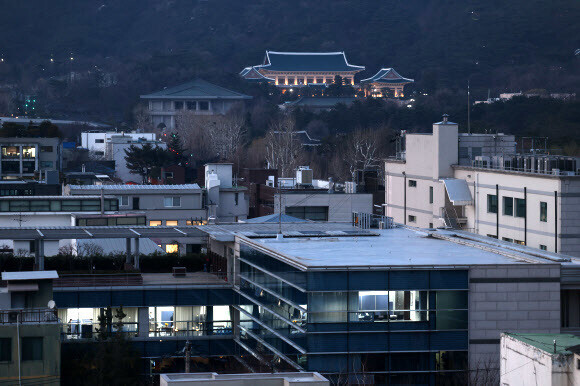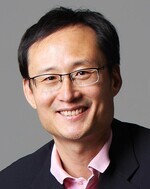hankyoreh
Links to other country sites 다른 나라 사이트 링크
[Column] The real “royal palace” Yoon should be concerned with is his clan of yes-men


The administrative handover process when a new political party comes into power is bound to be difficult, but never before has a presidential transition committee proved to be its own worst enemy to the degree the current one has. Lee Kyung-sook, who served as the head of former President Lee Myung-bak’s transition team, became the butt of a joke with her statement on how to properly spell the English word “orange” in Korean, but at least the presidential transition committee then didn’t lower the public’s expectations about the incoming administration’s ability to run state affairs.
But the situation has taken a turn for the worse for President-elect Yoon Suk-yeol’s transition team. According to findings of a survey by Realmeter announced Monday, only 49.2% of South Koreans were hopeful that Yoon would do a good job with government administration, down 3.5 percentage points from just a week prior. It’s unprecedented for an incoming president’s support rating to fall below 50% before their inauguration. Needless to say, the decisive factor that dampened the public’s anticipation for the Yoon administration has been the president-elect’s obstinacy regarding his plan to move the presidential office out of the Blue House.
It can certainly be said that political division and conflict are so severe in South Korea, as the outcome of the presidential election has made clear, that they are directly contributing to Yoon’s declining support rating. But the more that’s the case, shouldn’t Yoon strive to embrace every subset of the citizenry and pay close attention to what’s being said by his opposition? Not many people would consider Yoon’s request for a special pardon for someone in his political camp — a former president in prison for corruption charges — as an attempt to bring the nation together.
On why he is trying to relocate the presidential office to Yongsan in such a hurry, Yoon said, “The Blue House is a symbol of imperial authority, and I absolutely refuse to move into it.” In some ways, it’s understandable — Yoon’s fear that the moment he sets foot in it, the Blue House will infuse him with its “imperial culture.”
But preoccupied with the idea that the Blue House is akin to a “royal palace,” Yoon seems incapable of seeing the big picture of how the legacy of former presidents that has accumulated in the Blue House over the years has expanded and complemented the capabilities of the presidential office. Though he criticizes the figure of the “emperor-like president,” Yoon is unable to reflect on himself and consider whether he himself is exhibiting the behavior of an “emperor-like president-elect.”
Take the Blue House situation room, which opened its doors in 2003. The situation room was established in an underground bunker located near the Blue House’s secretariat building, which was set up during the Park Chung-hee administration of the Third Republic in case of attacks by North Korea. Strong enough to withstand the explosion of 2,000-pound bombs, the long-abandoned bunker allowed the Blue House to create a high-tech situation room with a much smaller budget than anticipated. Key information from 22 government agencies including the military, police, and the fire department is gathered in real-time at the situation room currently, but soon the facility will have to close shop.
Yoon’s camp has said the incoming administration will utilize the Ministry of National Defense’s situation room in Yongsan anew, but only information related to the military can be accessed there. The Defense Ministry situation room’s functions may be upgraded, but while that process takes place, the presidential office’s role as the control tower for national crises will become extremely limited.
What if a large-scale disaster happens during that interval? While it may be possible to move desks and cabinets out of the Blue House within a 50-day period, it would be impossible to relocate its security, military, and command facilities that help the president quickly make urgent decisions that have been built and enhanced over decades within such a short time frame — nor would that be desirable.
Everyone makes judgments based on their own experiences and beliefs. That’s how arrogance takes root in the heart of the powerful, as was the case with former President Park Geun-hye’s “seven missing hours” during the Sewol ferry disaster that ultimately brought the dictator’s daughter down. On the day of the ferry’s sinking, Park didn’t report to work at her office in the Blue House’s main building. That day wasn’t the exception — on the three to four days out of a given week when she didn’t have outside engagements, Park worked alone at the presidential residence.
What could have been the reason? During the Park Chung-hee administration, both the presidential office and the presidential residence were located in the Blue House’s main building. Having grown up in that environment, Park Geun-hye may have come to believe that the presidential residence is essentially the presidential office.
Many are looking at Yoon with concern because he’s lived as a prosecutor, investigating others all his life. He doesn’t have any experience as a politician who puts the nation and public opinion first, even if that’s criticized as pretense. Of course, it can’t be denied that Yoon’s perceived honesty had a positive effect in leading to his victory in the election. But administrating state affairs is not the same as prosecutorial investigations.
Unlike investigations, for which prosecutors try to prove criminal charges by any and all means once they’ve come to a conclusion, politics require the ability to take a step back according to the nation’s will and take a roundabout way if necessary. Doing so is how one minimizes conflict. The fact that Yoon immediately adjusted his plan to set up his presidential office in Yongsan once he realized that a Gwanghwamun office isn’t feasible is reminiscent of a prosecutor who tightens his chokehold on a criminal suspect by opening up a separate investigation when the original probe proves unfruitful.
At the end of the day, what made the Blue House a “royal palace” is none other than the people who occupied it. Take a look at what’s surrounding the presidential transition committee. It’s besieged by Yoon’s close aides who, instead of honestly conveying the public’s concerns about Yoon’s plan to relocate the presidential office, are extolling the president-elect’s bullheadedness as “firm resolution” and framing any opposition to the plan as a “negation of the presidential election’s outcome.”
If Yoon continues to remain shielded by a wall of yes-men like this, he won’t be able to escape the “royal palace” even if he moves the presidential office to the middle of Gangnam, let alone Yongsan. The self-righteousness of an emperor will take root in such an environment, taking over the inner workings of the president and ultimately blinding him.
Please direct questions or comments to [english@hani.co.kr]

Editorial・opinion
![[Column] Season 2 of special prosecutor probe may be coming to Korea soon [Column] Season 2 of special prosecutor probe may be coming to Korea soon](https://flexible.img.hani.co.kr/flexible/normal/500/300/imgdb/original/2024/0426/3317141030699447.jpg) [Column] Season 2 of special prosecutor probe may be coming to Korea soon
[Column] Season 2 of special prosecutor probe may be coming to Korea soon![[Column] Park Geun-hye déjà vu in Yoon Suk-yeol [Column] Park Geun-hye déjà vu in Yoon Suk-yeol](https://flexible.img.hani.co.kr/flexible/normal/500/300/imgdb/original/2024/0424/651713945113788.jpg) [Column] Park Geun-hye déjà vu in Yoon Suk-yeol
[Column] Park Geun-hye déjà vu in Yoon Suk-yeol- [Editorial] New weight of N. Korea’s nuclear threats makes dialogue all the more urgent
- [Guest essay] The real reason Korea’s new right wants to dub Rhee a founding father
- [Column] ‘Choson’: Is it time we start referring to N. Korea in its own terms?
- [Editorial] Japan’s rewriting of history with Korea has gone too far
- [Column] The president’s questionable capacity for dialogue
- [Column] Are chaebol firms just pizza pies for families to divvy up as they please?
- [Column] Has Korea, too, crossed the Rubicon on China?
- [Correspondent’s column] In Japan’s alliance with US, echoes of its past alliances with UK
Most viewed articles
- 1‘We must say no’: Seoul defense chief on Korean, USFK involvement in hypothetical Taiwan crisis
- 2Is Japan about to snatch control of Line messenger from Korea’s Naver?
- 3[Editorial] Korea’s surprise Q1 growth requires objective assessment, not blind fanfare
- 4Division commander ordered troops to enter raging flood waters before Marine died, survivor says
- 5[Reportage] On US campuses, student risk arrest as they call for divestment from Israel
- 6Korea’s 1.3% growth in Q1 signals ‘textbook’ return to growth, says government
- 7No good, very bad game for Korea puts it out of Olympics for first time since 1988
- 8Flying “new right” flag, Korea’s Yoon Suk-yeol charges toward ideological rule
- 9N. Korean delegation’s trip to Iran shows how Pyongyang is leveraging ties with Moscow
- 10[Special report- Part III] Curses, verbal abuse, and impossible quotas